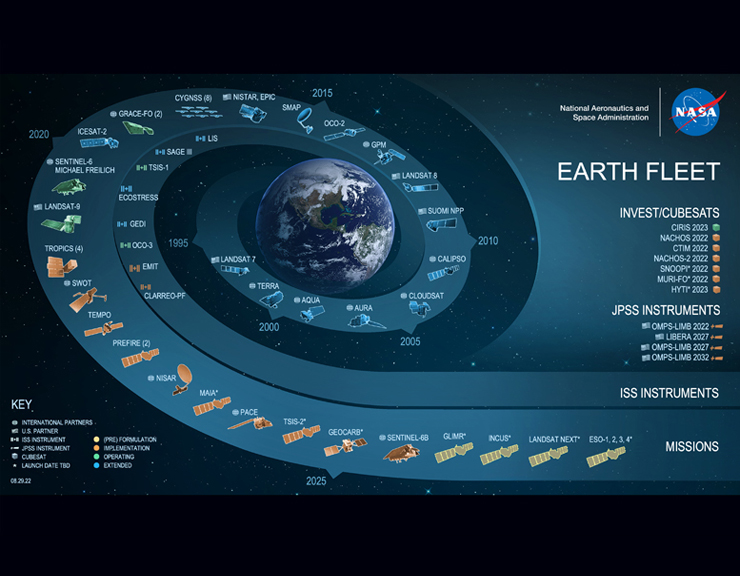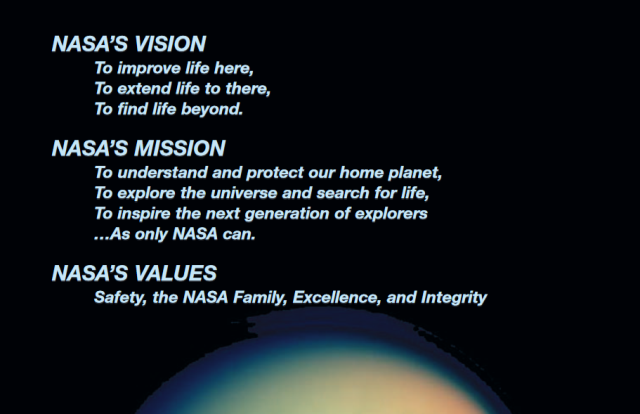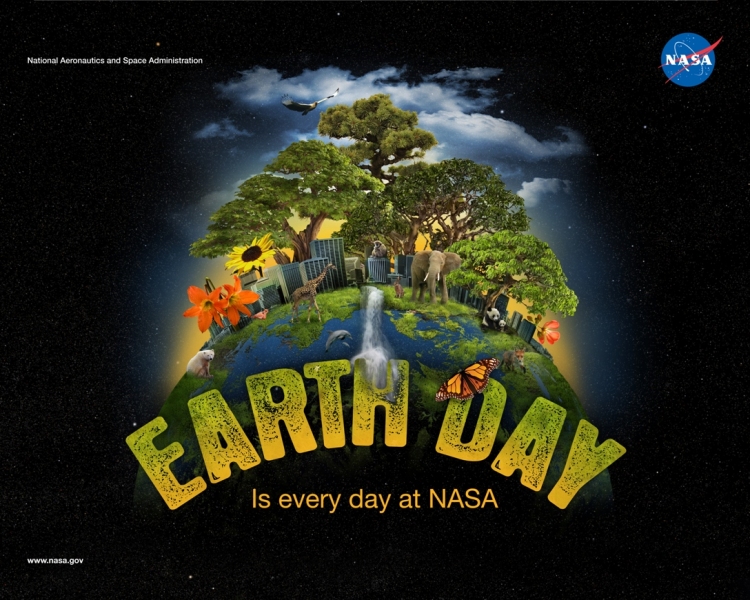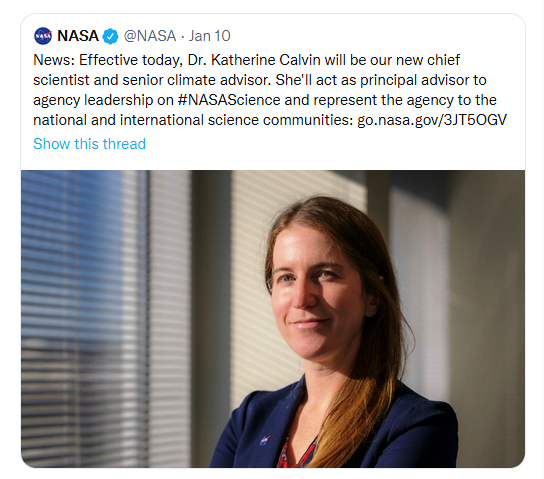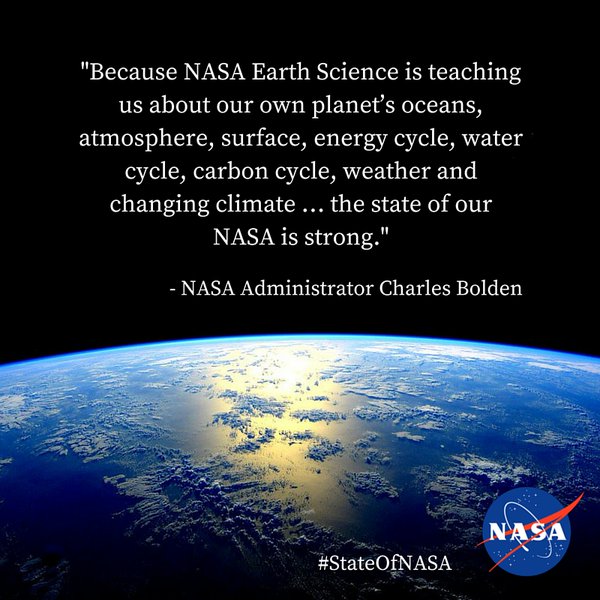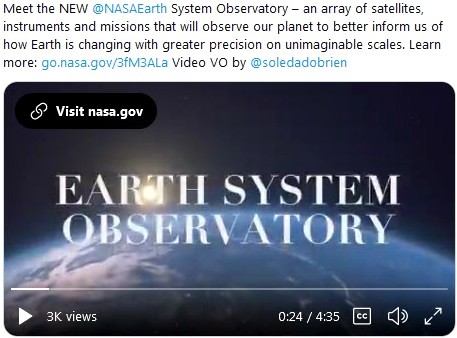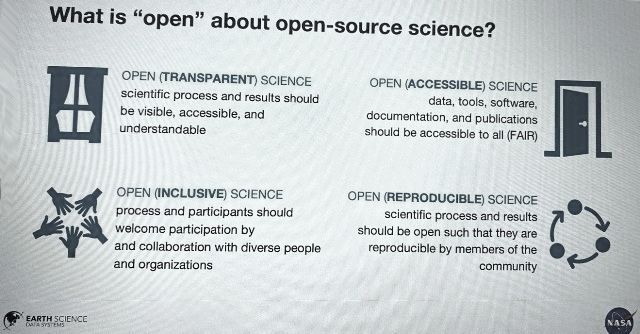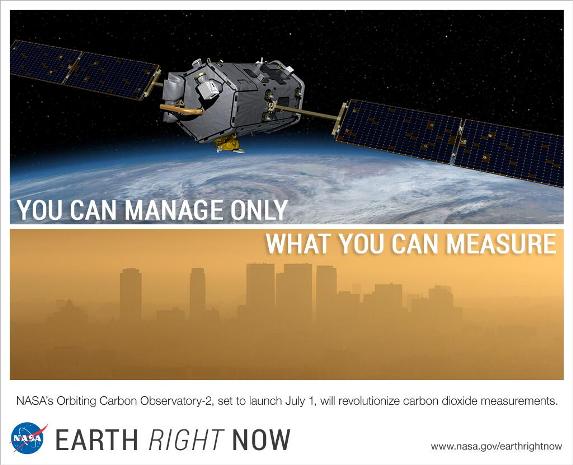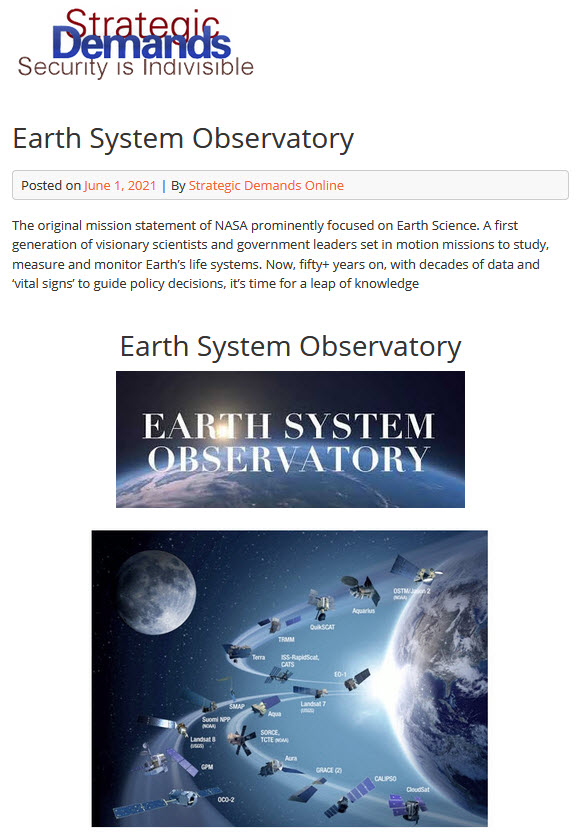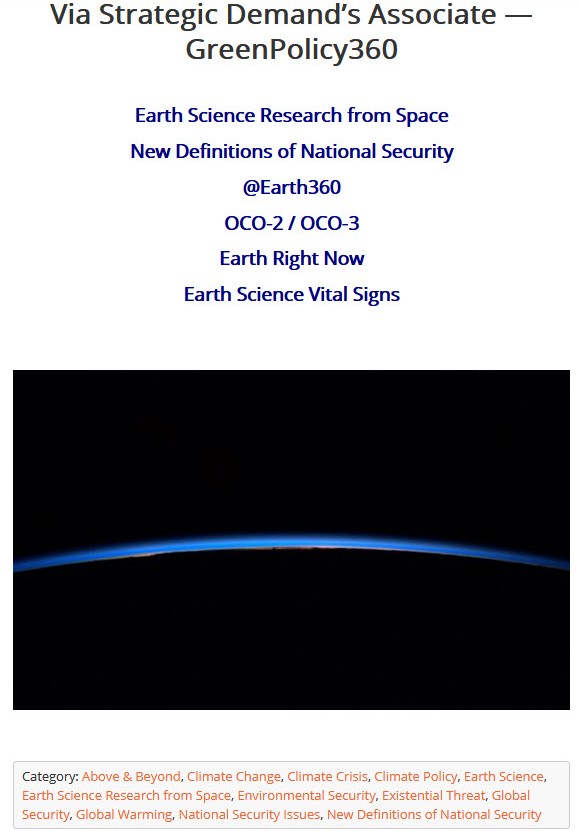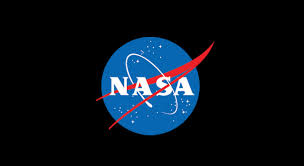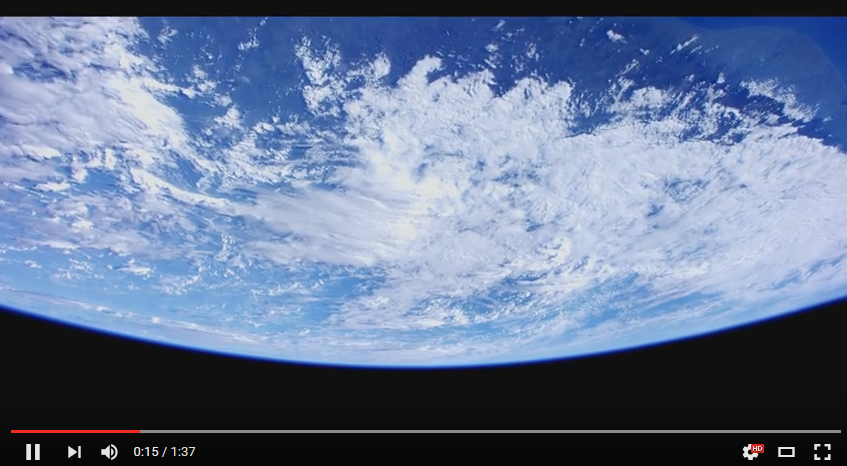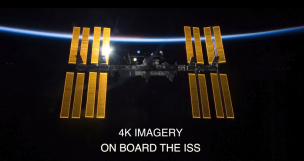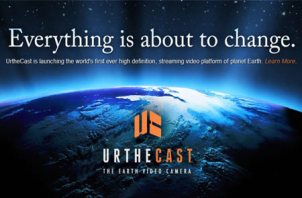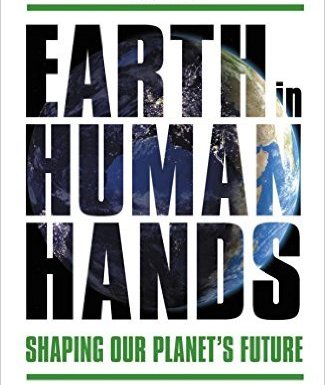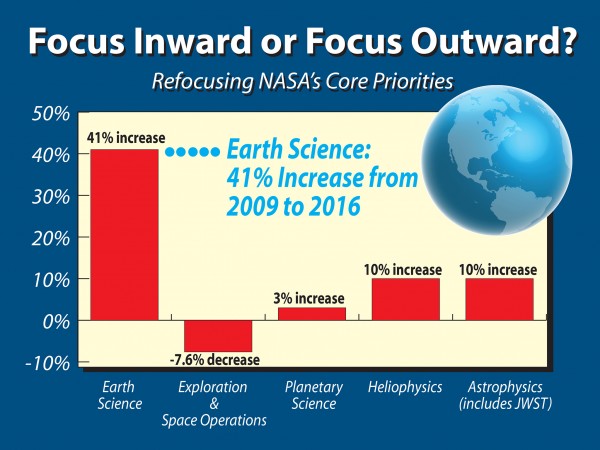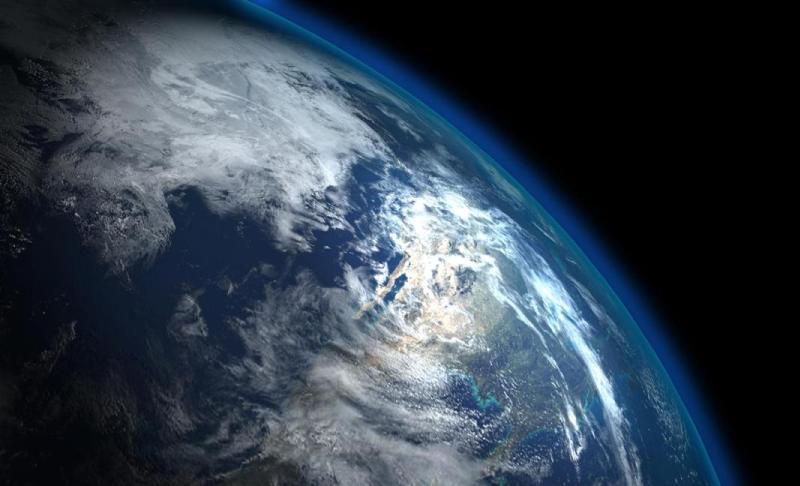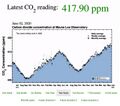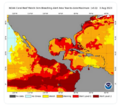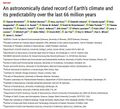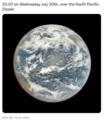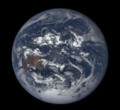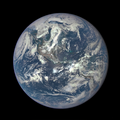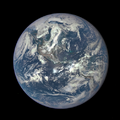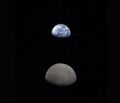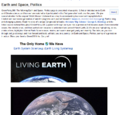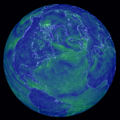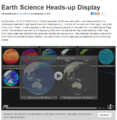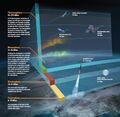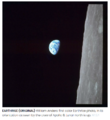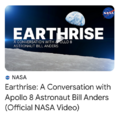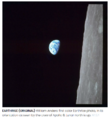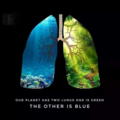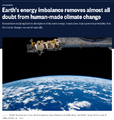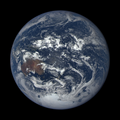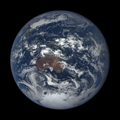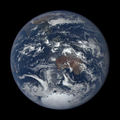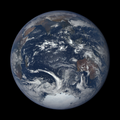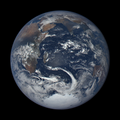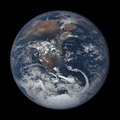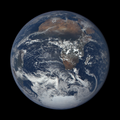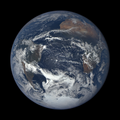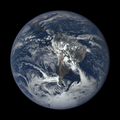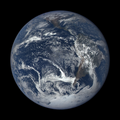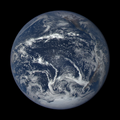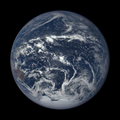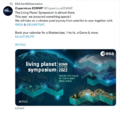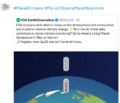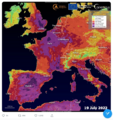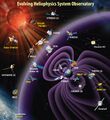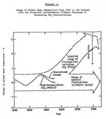Category:NASA: Difference between revisions
Siterunner (talk | contribs) No edit summary |
Siterunner (talk | contribs) No edit summary |
||
| (22 intermediate revisions by the same user not shown) | |||
| Line 4: | Line 4: | ||
[https://www.nasa.gov/connect/ebooks/earth_detail.html | [https://www.nasa.gov/connect/ebooks/earth_detail.html '''''NASA Origins with a Planet Earth Mission'''''] | ||
: ''“To understand and protect our home planet; to explore the universe and search for life; to inspire the next generation of explorers ... as only NASA can.”'' | |||
[[File:Earth-NASA.jpg]] | [[File:Earth-NASA.jpg]] | ||
| Line 10: | Line 14: | ||
[[File:NASA | ''In the National Aeronautics and Space Act, which established the agency in 1958, the first objective of the agency was listed as "the expansion of human knowledge of the earth and of phenomena in the atmosphere and space."'' | ||
* https://www.nasa.gov/offices/ogc/about/space_act1.html | |||
''The Space Act has been amended many times since 1958 but these goals have been little changed. In NASA’s Authorization Act for 1985 the expansion of human knowledge “of the Earth” was added to goal.'' | |||
* https://history.nasa.gov/spaceact-legishistory.pdf | |||
🌎 | |||
The '''"EOS", an Earth Observing System, tracing its origins to the beginnings of [https://www.greenpolicy360.net/w/Earth_Science_Research_from_Space Earth Science Research from Space]''' | |||
GreenPolicy360 looks at visionaries who set in motion first-of-its-type digital, multispectral imaging of Planet Earth | |||
[[File:Earth Observing System - fleet of satellites.png]] | |||
🌎 | |||
'''NASA's continuing vision and mission -- “To understand and protect our home planet"''' | |||
[[File:NASA's continuing vision and mission - as of 2005.png]] | |||
GreenPolicy360: We are putting forward a proposal to restore the "understand and protect" Earth Science provision to the Mission Statement of NASA. | |||
A number of years ago, Journalist Andrew Revkin wrote about the removal of this initial provision that was an essential part of the beginning of NASA as a government agency. | |||
We believe that, although this language was 'silently' removed in 2006, the earth science mission continue to playing an essential role in the missions of NASA and NASA's work. | |||
Here is what Andrew Revkin wrote some 15 years ago: | |||
>Andrew Revkin/July 22, 2006/ NY Times | |||
>“To understand and protect our home planet; to explore the universe and search for life; to inspire the next generation of explorers ... as only NASA can.” | |||
[[File:EarthDayatNASA 2.jpg]] | |||
>In February 2006, the phrase "to understand and protect the home planet" was quietly removed from the National Aeronautics and Space Administration (NASA)'s official mission statement. | |||
>It is the first time since NASA’s founding in 1958 that the mission statement does not explicitly include mention of the Earth. | |||
Here is part of NASA Administrator Bill Nelson's testimony before the Senate oversight committee in 2022: | |||
INDEED A LOT OF PEOPLE THINK OF NASA AS THE SPACE AGENCY. DON'T FORGET TO THE FIRST A, AERONAUTICS. BUT ALSO, PEOPLE DON'T REALIZE IT IS ALSO THE POINT OF THE SPHERE ON CLIMATE AND CLIMATE CHANGE BECAUSE ALL THE MEASUREMENTS THAT ARE BEING MADE ARE DONE BY INSTRUMENTS THAT WE DESIGN, BUILD, LAUNCH AND MANY OF THEM WE OPERATE. | |||
OVER THE COURSE OF THE NEXT DECADE WE ARE GOING TO HAVE A GREAT '''OBSERVATORY OF FIVE ADDITIONAL MAJOR SPACECRAFT''' THAT ALL OF THIS INFORMATION IS GOING TO BE PUT INTO A 3D COMPOSITE ON PRECISELY WHAT IS HAPPENING TO THE EARTH'S CLIMATE. WHAT'S HAPPENING TO THE WATER, TO THE LAND, TO THE ICE, TO THE ATMOSPHERE. WE ARE PUTTING UP AT THE END OF THIS YEAR A MISSION THAT IS GOING TO BE ABLE TO MEASURE FOR THE FIRST TIME THE ELEVATION OF THE STREAMS AND RIVERS AND LAKES, THE FRESHWATER. WE'VE BEEN ABLE TO MEASURE THE ELEVATION OF THE OCEANS, THE SALTWATER. WE ARE GOING TO BE ABLE TO FIND OUT VERY PRECISELY WHAT IS HAPPENING TO THE ICE. | |||
ALL OF THIS AND WE HAVE THE SUPPORT OF THE WHITE HOUSE ON THIS AND WE HOPE WE WILL HAVE YOUR SUPPORT. WE ARE GOING TO CREATE IF YOU CAN ENVISION IN SPACE TERMS A MISSION CONTROL CENTER. IT'S GOING TO BE CALLED THE EARTH INFORMATION CENTER. IT'S GOING TO BRING ALL OF THIS DATA IN AND IT'S GOING TO BE DISPLAYED AND IT'S GOING TO BE AVAILABLE TO EVERYBODY, NOT JUST GOVERNMENT AT ALL LEVELS INCLUDING YOUR LOCAL COUNTY COMMISSION WHEN THEY ARE PLANNING, BUT IT'S GOING TO BE AVAILABLE TO SCHOOLS AND UNIVERSITIES AND THE PRIVATE SECTOR AS WELL AS TO WHAT IS HAPPENING AND THE CHANGES THAT ARE HAPPENING TO THE CLAIMANT. | |||
SJS/Siterunner: Readers of GreenPolicy360 can look back at your GreenPolicy founder's work with George E. Brown, who was instrumental as a leader in Congress for over 30 years and led Earth Science efforts, including advancing NASA's first generation of earth research from space. | |||
<big>'''[[George E. Brown Jr]]'''</big> | |||
* https://www.greenpolicy360.net/w/George_E._Brown_Jr | |||
* https://www.greenpolicy360.net/w/File:US_Public_Law_95-367.png | |||
* https://www.greenpolicy360.net/w/Earth_Science_Research_from_Space | |||
* https://www.greenpolicy360.net/w/Planet_Citizens,_Planet_Scientists | |||
Congressman Brown's point of view for over 30 yrs in Congress was that technology, science, data are guides necessary for smart policy decisions. Check out his record. George set in motion many of the programs and missions to accomplish multi generational environmental protection goals that we have taken up and carried on... | |||
The Original Mission Statement of NASA ((1958) provided Congressional intent and guidance to the first generation of space programs. George, if he were here, would've done everything within his power to protect the original mission statement, even as misinformation and denial are rampant these days ... | |||
○ ○ ○ ○ ○ ○ ○ ○ | |||
'''January 2022''' | |||
[[File:Dr Katherine Calvin appointed NASA chief scientist and senior climate advisor.png]] | |||
:::○ ○ ○ ○ ○ ○ ○ ○ ○ ○ ○ ○ ○ ○ ○ ○ ○ ○ ○ ○ ○ ○ ○ ○ ○ ○ ○ ○ ○ ○ ○ | |||
[[File:NASA | [[File:NASA strong.jpg]] | ||
| |||
<big><big><big>'''''Earth Observation System / EOS'''''</big></big></big> | <big><big><big>'''''Earth Observation System / EOS'''''</big></big></big> | ||
| Line 31: | Line 123: | ||
<big>Essential in today's world and the intense need to address the #climatecrisis</big> | |||
Earth science, atmospheric science, measuring and monitoring, open source/access to the data ... | |||
[[File:NASA Earth Science - Open Source Info.jpg]] | |||
: [[File:You can manage only what you can measure Dr David Crisp, OCO-2, June 2014 m.jpg]] | |||
<big><font color=blue> | Our climate action agenda ... [http://www.planetcitizens.org '''planet citizens'''] making a positive difference | ||
:: [[File:Earth System Observatory-1.jpg]] | |||
:: [[File:Earth System Observatory-2.jpg]] | |||
<big><font color=blue>○ ○ ○ ○ ○ ○ ○ ○ ○ ○ ○ ○ ○ ○ ○ ○ ○</font></big> | |||
| Line 75: | Line 179: | ||
<big><font color=blue> | <big><font color=blue>○ ○ ○ ○ ○ ○ ○ ○ ○</font></big> | ||
| Line 148: | Line 252: | ||
''We know we aren’t the only people working to safeguard and understand our home planet. As you celebrate Earth Day, we’re asking you to share on social media what you’re doing to mark the day and celebrate our fragile home in space.'' | ''We know we aren’t the only people working to safeguard and understand our home planet. As you celebrate Earth Day, we’re asking you to share on social media what you’re doing to mark the day and celebrate our fragile home in space.'' | ||
''https://www.facebook.com/nasasolarsystem/videos/10153537798177918/'' | ''* https://www.facebook.com/nasasolarsystem/videos/10153537798177918/'' | ||
''https://www.facebook.com/nasasolarsystem/?pnref=story'' | ''* https://www.facebook.com/nasasolarsystem/?pnref=story'' | ||
''http://www.nasa.gov/content/goddard/2016/join-nasa-for-a-24seven-celebration-of-earth-day'' | ''* http://www.nasa.gov/content/goddard/2016/join-nasa-for-a-24seven-celebration-of-earth-day'' | ||
| Line 185: | Line 289: | ||
Reel 1 / A view of life in space is getting a boost with the introduction of '''4K Ultra High-Definition (UHD) video''', providing an unprecedented look at what it's like to live and work aboard the International Space Station. This important new capability will allow researchers to acquire high resolution—high frame rate video to provide new insight into the vast array of experiments taking place every day. Cameras will also bestow breathtaking views of planet Earth and space station activities for those still dreaming of making the trip to outer space. | Reel 1 / A view of life in space is getting a boost with the introduction of '''4K Ultra High-Definition (UHD) video''', providing an unprecedented look at what it's like to live and work aboard the International Space Station. This important new capability will allow researchers to acquire high resolution—high frame rate video to provide new insight into the vast array of experiments taking place every day. Cameras will also bestow breathtaking views of planet Earth and space station activities for those still dreaming of making the trip to outer space. | ||
<big><font color=blue>○ ○ ○ ○ ○ ○ ○ ○ ○ ○ ○ ○ ○ ○ ○ ○ ○</font></big> | <big><font color=blue>○ ○ ○ ○ ○ ○ ○ ○ ○ ○ ○ ○ ○ ○ ○ ○ ○</font></big> | ||
| Line 200: | Line 305: | ||
See storms swirl over the oceans, watch the sun rise and set 16 times a day, and experience our [http://www.greenpolicy360.net/w/Blue_Marble_Collection '''Blue Marble'''] as a [http://www.earthpov.com '''planet citizen'''] watching the earth rotate and roll beneath the ISS. | See storms swirl over the oceans, watch the sun rise and set 16 times a day, and experience our [http://www.greenpolicy360.net/w/Blue_Marble_Collection '''Blue Marble'''] as a [http://www.earthpov.com '''planet citizen'''] watching the earth rotate and roll beneath the ISS. | ||
http://www.greenpolicy360.net/w/Blue_Marble_Collection | * http://www.greenpolicy360.net/w/Blue_Marble_Collection | ||
| Line 255: | Line 360: | ||
• http://www.nasa.gov/topics/earth/index.html | • http://www.nasa.gov/topics/earth/index.html | ||
:• http://www.nasa.gov/smap/ | :• http://www.nasa.gov/smap/ | ||
: | :• http://www.nasa.gov/mission_pages/GPM/main/index.html | ||
:• http://www.nasa.gov/rapidscat/ | :• http://www.nasa.gov/rapidscat/ | ||
| Line 298: | Line 402: | ||
:• https://soundcloud.com/nasa | :• https://soundcloud.com/nasa | ||
○ | ○ | ||
[[File:Earth in Human Hands.jpg]] | |||
| Line 359: | Line 468: | ||
::::[https://www.greenpolicy360.net/w/Category:Earth_Science_from_Space '''Measuring & Monitoring Planet Earth Now'''] | ::::[https://www.greenpolicy360.net/w/Category:Earth_Science_from_Space '''Measuring & Monitoring Planet Earth Now'''] | ||
[[File:'Thin Blue Layer' of Earth's Atmosphere 2.jpg]] | |||
[[Thin Blue Layer]] | |||
🌎 | |||
Revision as of 14:36, 3 June 2023
<addthis />
NASA Origins with a Planet Earth Mission
- “To understand and protect our home planet; to explore the universe and search for life; to inspire the next generation of explorers ... as only NASA can.”
In the National Aeronautics and Space Act, which established the agency in 1958, the first objective of the agency was listed as "the expansion of human knowledge of the earth and of phenomena in the atmosphere and space."
The Space Act has been amended many times since 1958 but these goals have been little changed. In NASA’s Authorization Act for 1985 the expansion of human knowledge “of the Earth” was added to goal.
🌎
The "EOS", an Earth Observing System, tracing its origins to the beginnings of Earth Science Research from Space
GreenPolicy360 looks at visionaries who set in motion first-of-its-type digital, multispectral imaging of Planet Earth
🌎
NASA's continuing vision and mission -- “To understand and protect our home planet"
GreenPolicy360: We are putting forward a proposal to restore the "understand and protect" Earth Science provision to the Mission Statement of NASA.
A number of years ago, Journalist Andrew Revkin wrote about the removal of this initial provision that was an essential part of the beginning of NASA as a government agency.
We believe that, although this language was 'silently' removed in 2006, the earth science mission continue to playing an essential role in the missions of NASA and NASA's work.
Here is what Andrew Revkin wrote some 15 years ago:
>Andrew Revkin/July 22, 2006/ NY Times
>“To understand and protect our home planet; to explore the universe and search for life; to inspire the next generation of explorers ... as only NASA can.”
>In February 2006, the phrase "to understand and protect the home planet" was quietly removed from the National Aeronautics and Space Administration (NASA)'s official mission statement.
>It is the first time since NASA’s founding in 1958 that the mission statement does not explicitly include mention of the Earth.
Here is part of NASA Administrator Bill Nelson's testimony before the Senate oversight committee in 2022:
INDEED A LOT OF PEOPLE THINK OF NASA AS THE SPACE AGENCY. DON'T FORGET TO THE FIRST A, AERONAUTICS. BUT ALSO, PEOPLE DON'T REALIZE IT IS ALSO THE POINT OF THE SPHERE ON CLIMATE AND CLIMATE CHANGE BECAUSE ALL THE MEASUREMENTS THAT ARE BEING MADE ARE DONE BY INSTRUMENTS THAT WE DESIGN, BUILD, LAUNCH AND MANY OF THEM WE OPERATE.
OVER THE COURSE OF THE NEXT DECADE WE ARE GOING TO HAVE A GREAT OBSERVATORY OF FIVE ADDITIONAL MAJOR SPACECRAFT THAT ALL OF THIS INFORMATION IS GOING TO BE PUT INTO A 3D COMPOSITE ON PRECISELY WHAT IS HAPPENING TO THE EARTH'S CLIMATE. WHAT'S HAPPENING TO THE WATER, TO THE LAND, TO THE ICE, TO THE ATMOSPHERE. WE ARE PUTTING UP AT THE END OF THIS YEAR A MISSION THAT IS GOING TO BE ABLE TO MEASURE FOR THE FIRST TIME THE ELEVATION OF THE STREAMS AND RIVERS AND LAKES, THE FRESHWATER. WE'VE BEEN ABLE TO MEASURE THE ELEVATION OF THE OCEANS, THE SALTWATER. WE ARE GOING TO BE ABLE TO FIND OUT VERY PRECISELY WHAT IS HAPPENING TO THE ICE.
ALL OF THIS AND WE HAVE THE SUPPORT OF THE WHITE HOUSE ON THIS AND WE HOPE WE WILL HAVE YOUR SUPPORT. WE ARE GOING TO CREATE IF YOU CAN ENVISION IN SPACE TERMS A MISSION CONTROL CENTER. IT'S GOING TO BE CALLED THE EARTH INFORMATION CENTER. IT'S GOING TO BRING ALL OF THIS DATA IN AND IT'S GOING TO BE DISPLAYED AND IT'S GOING TO BE AVAILABLE TO EVERYBODY, NOT JUST GOVERNMENT AT ALL LEVELS INCLUDING YOUR LOCAL COUNTY COMMISSION WHEN THEY ARE PLANNING, BUT IT'S GOING TO BE AVAILABLE TO SCHOOLS AND UNIVERSITIES AND THE PRIVATE SECTOR AS WELL AS TO WHAT IS HAPPENING AND THE CHANGES THAT ARE HAPPENING TO THE CLAIMANT.
SJS/Siterunner: Readers of GreenPolicy360 can look back at your GreenPolicy founder's work with George E. Brown, who was instrumental as a leader in Congress for over 30 years and led Earth Science efforts, including advancing NASA's first generation of earth research from space.
Congressman Brown's point of view for over 30 yrs in Congress was that technology, science, data are guides necessary for smart policy decisions. Check out his record. George set in motion many of the programs and missions to accomplish multi generational environmental protection goals that we have taken up and carried on...
The Original Mission Statement of NASA ((1958) provided Congressional intent and guidance to the first generation of space programs. George, if he were here, would've done everything within his power to protect the original mission statement, even as misinformation and denial are rampant these days ...
○ ○ ○ ○ ○ ○ ○ ○
January 2022
- ○ ○ ○ ○ ○ ○ ○ ○ ○ ○ ○ ○ ○ ○ ○ ○ ○ ○ ○ ○ ○ ○ ○ ○ ○ ○ ○ ○ ○ ○ ○
Earth Observation System / EOS
Essential in today's world and the intense need to address the #climatecrisis
Earth science, atmospheric science, measuring and monitoring, open source/access to the data ...
Our climate action agenda ... planet citizens making a positive difference
○ ○ ○ ○ ○ ○ ○ ○ ○ ○ ○ ○ ○ ○ ○ ○ ○
Earth Right Now (Daily via NASA)
• (TW) https://twitter.com/NASAClimate
• (TW) https://twitter.com/NASA
• (TW) https://twitter.com/NASAJPL
Earth Research from Space @ GreenPolicy online
2018 Update / New NASA Chief Says He Will Protect Climate Research
After his previous rejection of climate science, Jim Bridenstine tells employees he will keep politics out of the agency’s work
Visit NASA
In the National Aeronautics and Space Act, which established the agency in 1958
The first objective of the agency was listed as “the expansion of human knowledge of the earth and of phenomena in the atmosphere and space.”
○ ○ ○ ○ ○ ○ ○ ○ ○
Planet Earth
From its origins, NASA has studied our planet in novel ways, using ingenious tools to study physical processes at work—from beneath the crust to the edge of the atmosphere. We look at it in macrocosm and microcosm, from the flow of one mountain stream to the flow of jet streams. Most of all, we look at Earth as a system, examining the cycles and processes—the water cycle, the carbon cycle, ocean circulation, the movement of heat—that interact and influence each other in a complex, dynamic dance across seasons and decades.
For all of the dynamism and detail we can observe from orbit, sometimes it is worth stepping back and simply admiring Earth. It is a beautiful, awe-inspiring place, and it is the only world most of us will ever know.
Of all celestial bodies within reach or view, as far as we can see, out to the edge, the most wonderful and marvelous and mysterious is turning out to be our own planet earth. There is nothing to match it anywhere, not yet anyway. — Lewis Thomas
Sixty years ago, with the launch of Explorer 1, NASA made its first observations of Earth from space. Fifty years ago, astronauts left Earth orbit for the first time and looked back at our “blue marble.” All of these years later, as we send spacecraft and point our telescopes past the outer edges of the solar system, as we study our planetary neighbors and our Sun in exquisite detail, there remains much to see and explore at home.
We are still just getting to know Earth through the tools of science...
• https://www.nasa.gov/connect/ebooks/earth_detail.html
- › Kindle readers: MOBI [18.9 MB]
- › All other eBook readers: EPUB [25.4 MB]
- › PDF readers: PDF [35.4 MB]
Mission Planet Earth: NASA, Earth Science News
- Earth Science Research from Space
- Look at how thin our atmosphere is
- Earth and Space, Politics
- Climate News
- Earth Right Now
○ ○ ○ ○ ○ ○ ○ ○ ○ ○ ○ ○ ○ ○
NASA's universe of images, with special emphasis on the home planet
April 2017 / Now available for planet citizens online in one searchable place (via the Cloud w/ AWS)
○
What's Really Warming the World...
"What's Really Warming the World? Climate deniers blame natural factors; NASA data proves otherwise."
NASA-GISS presents interactive demonstrations of decades of scientific data and study...
○
Join NASA for a #24Seven Celebration of Earth Day
This Earth Day, April 22, 2016, NASA is giving the world an insider’s look into the myriad activities the space agency conducts in a typical day to study and protect our home planet.
And -- we’re asking the world to share your Earth Day with us.
On April 22, NASA will post about 200 images across nearly 100 different social media channels that capture the breadth of the agency’s 24-hour-a-day work to study Earth. The images were captured during the week of March 27, but have been assembled chronologically to tell a story of a “day in the life” of NASA’s Earth science work. The time-stamped posts -- hashtagged #24Seven -- will begin publishing at 12:01 a.m. EDT and will continue throughout the day.
We know we aren’t the only people working to safeguard and understand our home planet. As you celebrate Earth Day, we’re asking you to share on social media what you’re doing to mark the day and celebrate our fragile home in space.
* https://www.facebook.com/nasasolarsystem/videos/10153537798177918/
* https://www.facebook.com/nasasolarsystem/?pnref=story
* http://www.nasa.gov/content/goddard/2016/join-nasa-for-a-24seven-celebration-of-earth-day
Visit featured Earth Day 2016 Planet Citizen sites @GreenPolicy360
- Vision of Planet Citizens - https://www.greenpolicy360.net/w/Planet_Citizens
- Hello Earth - http://www.greenpolicy360.net/w/HelloEarth
- Earth POV - http://www.greenpolicy360.net/w/EarthPOV
○ ○ ○ ○ ○ ○ ○ ○ ○ ○ ○ ○ ○ ○ ○ ○ ○ ○
Game-Changing Energy Technology
NASA Research Could Save Commercial Airlines Billions in New Era of Aviation
New technologies, developed under the purview of NASA’s Environmentally Responsible Aviation (ERA) project, could cut airline fuel use in half, pollution by 75 percent and noise to nearly one-eighth of today’s levels.
“If these technologies start finding their way into the airline fleet, our computer models show the economic impact could amount to $255 billion in operational savings between 2025 and 2050,” said Jaiwon Shin, NASA’s associate administrator for aeronautics research.
○ ○ ○ ○ ○ ○ ○ ○ ○ ○ ○ ○ ○ ○
Life on the International Space Station
• https://youtu.be/ouv1Un1F36A
Reel 1 / A view of life in space is getting a boost with the introduction of 4K Ultra High-Definition (UHD) video, providing an unprecedented look at what it's like to live and work aboard the International Space Station. This important new capability will allow researchers to acquire high resolution—high frame rate video to provide new insight into the vast array of experiments taking place every day. Cameras will also bestow breathtaking views of planet Earth and space station activities for those still dreaming of making the trip to outer space.
○ ○ ○ ○ ○ ○ ○ ○ ○ ○ ○ ○ ○ ○ ○ ○ ○
Live HDTV from the International Space Station
• https://www.urthecast.com/live
Urthecast and NASA bring you live, high definition video from the ISS. Perched 250 miles (400 km) above Earth’s surface, four high-definition (HDEV) cameras capture live 24/7 video of our planet.
See storms swirl over the oceans, watch the sun rise and set 16 times a day, and experience our Blue Marble as a planet citizen watching the earth rotate and roll beneath the ISS.
○ ○ ○ ○ ○ ○ ○ ○ ○ ○ ○ ○ ○ ○ ○ ○ ○
Open Access / 2015
Your NASA open access database
- Open Access to Space Station Science Data and Use of the NASA Physical Sciences Informatics System - http://psi.nasa.gov/home.aspx
○ ○ ○ ○ ○ ○ ○ ○ ○ ○ ○ ○ ○ ○ ○ ○ ○
NASA Links/Online Resources
• http://www.nasa.gov/ — http://climate.nasa.gov/
• http://www.jpl.nasa.gov/ — https://twitter.com/NASAJPL
• http://science.nasa.gov/search/
• http://www.nasa.gov/subject/7782/earth-research-findings/
○
○
○
• https://twitter.com/hashtag/EarthRightNow?src=hash
• http://science.nasa.gov/earth-science/
• http://www.nasa.gov/topics/earth/index.html
○
○
Earth Science Research from Space
In the National Aeronautics and Space Act, which established the agency in 1958, the first objective of the agency was listed as “the expansion of human knowledge of the earth and of phenomena in the atmosphere and space.”
From 2002 until February 2006, NASA’s mission statement, prominently featured in its budget and planning documents, read: “To understand and protect our home planet; to explore the universe and search for life; to inspire the next generation of explorers ... as only NASA can.”
In early February, the statement was quietly altered, with the phrase “to understand and protect our home planet” deleted. In this year’s budget and planning documents, the agency’s mission is “to pioneer the future in space exploration, scientific discovery and aeronautics research.”
David E. Steitz, a spokesman for the National Aeronautics and Space Administration, said the aim was to square the statement with President Bush’s goal of pursuing human spaceflight to the Moon and Mars.
- http://www.nytimes.com/2006/07/22/science/22nasa.html by Andy Revkin
○ ○ ○ ○ ○ ○ ○ ○ ○ ○ ○ ○ ○
NASA-JPL
○ ○ ○ ○ ○ ○ ○ ○ ○ ○ ○
Note re: the Use of NASA images at GreenPolicy360
Fair use of NASA missions images come under NASA and U.S. law and regulations placing these images legally in the Public Domain.
Under United States copyright law, works created by the U.S. federal government or its agencies cannot be copyrighted. (This does not apply to works created by state or local governments.)
GreenPolicy360 make copious use of many NASA images, particularly regarding #EarthScience missions and our focus on the vital importance of #AtmosphericScience
Please visit our "Thin Blue" site in our GreenPolicy network at www.thinbluelayer.com
🌎
Any questions re: use of images can be directed to GreenPolicy360 at [email protected]
We Encourage non-commercial sharing of images/content/data presented at GreenPolicy360
Except where otherwise noted, content on this site is licensed under a Creative Commons Attribution 4.0 International license.
GreenPolicy360 requests that all sharing and/or use of our content is accompanied with attribution to GreenPolicy360.net
• https://creativecommons.org/licenses/by/4.0/
Subcategories
This category has the following 19 subcategories, out of 19 total.
A
E
N
O
P
S
T
U
W
Pages in category "NASA"
The following 115 pages are in this category, out of 115 total.
C
- Carbon Brief
- Climate Change - Global Warming Keyword-Terms
- Climate Change Denier Talking Points -- and Rebuttals
- Climate Change Summit Paris
- Climate Desk
- Climate Law Blog @Columbia Law School
- Climate migration
- Climate News
- Climate News Events Archive ... 1970 to Today
- Climate Plans Enforcement - Resources
- Climate Problems, Climate Solutions
- Creatively Green
E
- Each of us can make a positive difference
- Earth
- Earth and Space, Politics
- Earth Day Summit - April 22 2021
- Earth from NASA
- Earth Imaging-New Space
- Earth Right Now
- Earth Science
- Earth Science Eco-Fields
- Earth Science Research from Space
- EarthPOV
- Earthrise
- EarthTime
- Earthviews from Astronauts
- Ecolivia
- Environmental Laws and Modern Environmental Movement
- Environmental Protection Agency
- Environmental Rules Rolled Back
- ESA Living Planet Announcement - May 2022
- Ethics and Climate Change
- European Union Green Deal - Fit for 55
- Extinction
- ExxonMobil and US House Science Committee v US Attorneys General and Environmental Groups
G
- George E. Brown Jr
- Glasgow Climate Summit - Pledges, Promises, Declarations - What's Next Up
- Global Climate Action Summit
- Global Fishing Watch
- GN-z11
- GOES-16
- Google Earth
- GP360 NewPages
- Green Best Practices
- Green Politics with GreenPolicy360
- Green Quotes
- Green Stories of the Day
- Green Stories of the Day - GreenPolicy360 Archive
- GreenAction
- Greening Our Blue Planet
- GreenPolicy360 Archive Highlights 2013
- GreenPolicy360 Archive Highlights 2014
- GreenPolicy360 Archive Highlights 2015
- GreenPolicy360 Archive Highlights 2016
- GreenPolicy360 Archive Highlights 2017
- GreenPolicy360 Archive Highlights 2018
- GreenPolicy360 Archive Highlights 2019
- GreenPolicy360 Archive Highlights 2020
- GreenPolicy360 Archive Highlights 2023
- GreenPolicy360 Highlights
L
P
- Pale blue dot
- Paris climate change conference, Dec12, 2015 report from Rebecca Solnit
- Permaculture Green Practices
- Permafrost
- Pictures from ISS
- Planet API
- Planet Citizen Action
- Planet Citizen Vision of Living Earth
- Planet Citizens
- Planet Earth Perspective
- Planet of the Humans, a documentary film
- Planetary.org
- PlanetCitizen
S
T
Media in category "NASA"
The following 200 files are in this category, out of 1,068 total.
(previous page) (next page)- Close In Paris Dec11,2015.png 917 × 328; 216 KB
- CO2 at Mauna Loa data - June 02, 2020 - 417.90 ppm.jpg 640 × 566; 66 KB
- CO2 cumulative emissions 1850 - 2021 - countries.jpg 640 × 462; 211 KB
- CO2 Emissions per Capita by Country 1960-2014.png 800 × 451; 424 KB
- CO2 emissions-around-the-world.png 800 × 595; 123 KB
- CO2 global pathways via IPCC AR6 - how will we respond.jpg 800 × 450; 57 KB
- CO2 higher than in the past 5 million yrs.jpg 514 × 285; 62 KB
- CO2 photo.JPG 800 × 536; 88 KB
- Coastal Connecticut sea level rise.png 480 × 549; 396 KB
- COP26 Climate Summit concludes.jpg 600 × 800; 160 KB
- COP26 concludes - 2.png 648 × 467; 177 KB
- COP26 concludes - 3.png 648 × 713; 416 KB
- COP26 concludes.png 648 × 528; 329 KB
- COP26 in GLASGOW - 31 OCT-12 NOV 2021.jpg 800 × 264; 51 KB
- COP27 'opening speech'.png 640 × 460; 160 KB
- COP28 News - Dec 13 2023.png 800 × 898; 410 KB
- Copernicus EU logo.jpg 400 × 400; 41 KB
- CopernicusEU - Sentinel5P Atmosphere Monitoring Mission - 2.jpg 795 × 1,477; 654 KB
- CopernicusEU - Sentinel5P Atmosphere Monitoring Mission.png 583 × 465; 222 KB
- Coral bleaching - August 2023.png 488 × 430; 261 KB
- Coral bleaching - NOAA - August 2023.png 488 × 338; 201 KB
- Costs of War US Post 9-11 War Spending.jpg 800 × 305; 60 KB
- Covering Climate Now.jpg 493 × 498; 67 KB
- Cradle of Civilization - and climate change.jpg 640 × 360; 70 KB
- CSDA Program and Planet.jpg 800 × 379; 99 KB
- Cumulative CO2 Emissions by Country Since 1850.png 800 × 445; 445 KB
- Dark sky by Jack Fusco.jpg 800 × 540; 119 KB
- Dated record of Earths climate - Science Report Sept 10 2020.jpg 735 × 669; 192 KB
- Day before Earth Day, April 21, 2015.png 1,275 × 752; 1.66 MB
- Death Valley ... the heat, what its like.jpg 640 × 381; 62 KB
- Defend Our Future 6-1-2020.jpg 585 × 458; 103 KB
- Democratic Climate Plan-Introduced June 2020.jpg 528 × 561; 117 KB
- Democratic National Convention-62 climate speakers.jpg 443 × 407; 57 KB
- Democratic Party Climate Bill - Aug 2022.png 640 × 269; 70 KB
- Democratic Party pres candidates debate in Miami-June 2019.jpg 800 × 534; 124 KB
- Democratic presidential candidates on the Green New Deal.jpg 800 × 359; 57 KB
- Denying human-caused climate change.jpg 639 × 620; 129 KB
- Deography.com ISS 30 June 2015.jpg 950 × 582; 467 KB
- DeSantis against climate science - 2.jpg 640 × 480; 122 KB
- DeSantis against climate science - again.jpg 460 × 640; 105 KB
- Diane Walder in Miami Beach.jpg 775 × 787; 147 KB
- Don't Look Up ....jpg 430 × 543; 172 KB
- Don't Look Up.jpg 800 × 450; 104 KB
- Donald Trump-Jair Bolsonaro-March 2019.jpg 640 × 455; 57 KB
- Dove minisat launch from ISS m.png 800 × 526; 528 KB
- Dove1 image.jpg 420 × 308; 26 KB
- Doves fly 2016.jpg 800 × 533; 89 KB
- Drawdown top ten solutions - 2017.png 498 × 654; 179 KB
- DSCOVR EPIC - July 20 2022.png 532 × 612; 315 KB
- Dscovr epic moontransit.gif 985 × 554; 2.97 MB
- DSCOVR w EPICcam, PlasMag & NISTAR.png 1,219 × 785; 1.49 MB
- DSCOVR w EPICcam.png 800 × 515; 968 KB
- DSCOVR-2015-First Set of Images-test.png 713 × 656; 491 KB
- DSCOVR-Day before Christmas2015.jpg 1,446 × 670; 122 KB
- DSCOVR-EPIC 187 1003705 americas dxm.png 985 × 985; 1.21 MB
- DSCOVR-EPIC 187 1003705 m americas dxm.png 502 × 502; 330 KB
- E&E.png 800 × 510; 474 KB
- Earth 2016 4k.png 847 × 466; 478 KB
- Earth AI - Feb 2022.png 482 × 480; 192 KB
- Earth and Moon, photos from Orion spaceship, NASA, Nov 28 2022.jpg 582 × 501; 16 KB
- Earth and Space, Politics.png 796 × 765; 349 KB
- Earth Breathing.jpg 800 × 450; 117 KB
- Earth conditions dynamic map.png 673 × 673; 770 KB
- Earth Day 2021 - Climate Summit News-1.jpg 491 × 270; 127 KB
- Earth Day 2022 - Act up.png 457 × 370; 155 KB
- Earth Day 50 years on.jpg 480 × 548; 107 KB
- Earth Day and Climate at the Center.jpg 595 × 604; 131 KB
- Earth Emoji.png 50 × 50; 2 KB
- Earth from Cassini-7656 MAIN PIA21445 figA.jpg 600 × 600; 117 KB
- Earth from the ISS.gif 480 × 270; 1.86 MB
- Earth gets hotter May2016.jpg 500 × 322; 28 KB
- Earth grassroots.jpg 374 × 238; 32 KB
- Earth Image Dailies from DSCOVR-EPIC.png 800 × 548; 387 KB
- Earth Information Center - 2022 Graphic NASA.png 800 × 981; 868 KB
- Earth Information Center - NASA 336.png 336 × 336; 279 KB
- Earth Information Center - NASA.png 768 × 769; 1.21 MB
- Earth Information Center from NASA.jpg 800 × 577; 94 KB
- Earth Observing System - fleet of satellites.png 740 × 576; 557 KB
- Earth planet changing.jpg 640 × 519; 82 KB
- Earth POV from the ISS Cupola-m.jpg 800 × 480; 71 KB
- Earth Research Findings 2015 1.png 1,088 × 686; 1.49 MB
- Earth Research Findings 2015 2.png 1,088 × 241; 512 KB
- Earth Right Now rapidscat 3of5 shareable.jpg 946 × 767; 322 KB
- Earth Right Now science.jpg 197 × 49; 3 KB
- Earth Science from Space-Monitoring Ice Melt.jpg 657 × 373; 60 KB
- Earth science missions in space US circa2017.jpg 800 × 448; 71 KB
- Earth Science Vital Signs, Pulse of the Planet Climate Essentials.png 692 × 441; 207 KB
- Earth Science Vital Signs, Pulse of the Planet EOS NASA 2014.png 758 × 776; 366 KB
- Earth Summit 1992-s.png 336 × 418; 283 KB
- Earth Summit 1992.jpg 600 × 746; 171 KB
- Earth System Observatory-1.jpg 580 × 833; 129 KB
- Earth System Observatory-2.jpg 580 × 831; 69 KB
- Earth System Observatory.jpg 457 × 338; 47 KB
- Earth topo observatory nasa 1024x512.jpg 1,024 × 512; 96 KB
- Earth trapping unprecedented amount of heat - NASA.jpg 468 × 373; 56 KB
- Earth via GOES 17 Weather Satellite - first full image May 2018.png 800 × 451; 834 KB
- Earth Viewing from the International Space Station.jpg 496 × 307; 45 KB
- Earth's atmosphere 814x458.jpg 814 × 458; 23 KB
- Earth-Day-flag.jpg 600 × 480; 31 KB
- Earth-NASA.jpg 800 × 265; 39 KB
- Earth-upper-atmosphere-NASA.jpg 800 × 781; 327 KB
- EarthDayatNASA .jpg 1,088 × 870; 745 KB
- EarthDayatNASA 2.jpg 750 × 600; 339 KB
- EarthDecadel Priorities-2018.jpg 779 × 529; 85 KB
- EARTHfromOrion NASA Dec5,2014.jpg 1,280 × 720; 196 KB
- EarthNow our planet is changing.jpg 585 × 368; 0 bytes
- EarthRightNow Earth Science @work via 2014-2015 NASA launches m.png 490 × 293; 308 KB
- EarthRightNow Earth Science @work via 2014-2015 NASA launches.png 1,441 × 862; 1.7 MB
- EarthRightNow Earth Science satellite fleet circa 2015 m.jpg 495 × 371; 126 KB
- EarthRightNow Earth Science satellite fleet circa 2015.jpg 1,500 × 1,125; 0 bytes
- EarthRightNow Five up in 11 months.jpg 1,024 × 830; 91 KB
- EarthRightNow Four up, one to go.jpg 1,024 × 830; 442 KB
- EarthRightNow One up, four to go.jpg 946 × 767; 279 KB
- EarthRightNow Two up, three to go.jpg 740 × 600; 251 KB
- Earthrise (NASA original Anders photo ).png 665 × 723; 539 KB
- Earthrise - NASA - Astro Bill Anders.png 497 × 479; 216 KB
- Earthrise - NASA original Anders photo.png 665 × 723; 539 KB
- Earthrise book cover (2008).jpg 709 × 1,070; 401 KB
- Earthrise images - vertical orig - and horizontal.png 800 × 201; 81 KB
- Earthrise Life Magazine January 1969.png 157 × 227; 42 KB
- Earthrise Planetary Awareness.jpg 768 × 992; 103 KB
- Earthrise, the way Anders saw it.jpg 314 × 429; 12 KB
- Earthrise2015 m.png 703 × 449; 346 KB
- Earthrise2015.png 1,004 × 642; 558 KB
- Earths Atmospheric Layers.JPG 800 × 532; 34 KB
- Earths two lungs.png 336 × 336; 130 KB
- EarthScience Missions via the EOS - 2022.png 800 × 219; 139 KB
- Economist.com global capital snapshot as of July 2020.jpg 800 × 477; 119 KB
- Ecostress Mission-Aug 2020.jpg 640 × 311; 85 KB
- EDF satellite - methane tracking.png 600 × 674; 388 KB
- Edwin Hubble announces existence of other galaxies - 1924.jpg 428 × 640; 76 KB
- Eiffel tower green.jpg 759 × 422; 28 KB
- Elon Musk quote - gas externality price.png 680 × 320; 199 KB
- Emissions graph - gleick tw 2018.jpg 640 × 364; 37 KB
- Energy Charter Treaty.jpg 512 × 480; 74 KB
- Energy Imbalance, Climate Change - Aug 1 2021.png 640 × 672; 394 KB
- Environmental laws in US - Supreme Court votes soon.png 800 × 414; 334 KB
- Environmental Protection Agency logo.png 380 × 414; 39 KB
- Environmental Security and a Thin Blue Layer around the Home Planet.png 800 × 308; 322 KB
- EnvirSecurity.png 558 × 166; 155 KB
- EOS EarthSats s.jpg 743 × 417; 64 KB
- EOSDIS EarthData Jan2015a.png 1,594 × 844; 701 KB
- EOSDIS EarthData Jan2015b.png 784 × 541; 488 KB
- EPA website - Climate Change priority - March 2021.jpg 786 × 600; 140 KB
- EPA website a 'ghost page' now.png 667 × 233; 45 KB
- Epic 1b 20151224005948 00 Dec24.png 2,048 × 2,048; 3.4 MB
- Epic 1b 20151224024751 00.png 2,048 × 2,048; 3.34 MB
- Epic 1b 20151224043554 00.png 2,048 × 2,048; 3.37 MB
- Epic 1b 20151224062357 00.png 2,048 × 2,048; 3.28 MB
- Epic 1b 20151224081159 00.png 2,048 × 2,048; 3.24 MB
- Epic 1b 20151224100002 00.png 2,048 × 2,048; 3.23 MB
- Epic 1b 20151224114805 00.png 2,048 × 2,048; 3.27 MB
- Epic 1b 20151224133608 00.png 2,048 × 2,048; 3.28 MB
- Epic 1b 20151224171214 00.png 2,048 × 2,048; 3.39 MB
- Epic 1b 20151224190017 00.png 2,048 × 2,048; 3.47 MB
- Epic 1b 20151224204820 00.png 2,048 × 2,048; 3.42 MB
- Epic 1b 20151224223623 00.png 2,048 × 2,048; 3.42 MB
- Epic rgb 20181003111530 0.jpg 1,000 × 879; 57 KB
- ESA Living Planet Symposium - Announcement.png 637 × 600; 508 KB
- ESA Living Planet Symposium - May 2022.png 700 × 600; 258 KB
- ESA re ice loss - April 2023.png 640 × 432; 213 KB
- ESG Fight - Feb 2023.png 396 × 194; 88 KB
- Estates at Acqualina - Sunny Isles Miami.jpg 746 × 600; 117 KB
- Estuary in Clearwater on Tampa Bay.jpg 3,584 × 2,016; 1.5 MB
- EU agrees to cut emissions 55 percent by 2030.jpg 800 × 558; 96 KB
- EU unveils new climate change policy - July 14 2021 - 1.jpg 800 × 234; 33 KB
- EU unveils new climate change policy - July 14 2021 - 2.jpg 800 × 552; 86 KB
- EU unveils new climate change policy - July 14 2021 - 3.jpg 800 × 549; 89 KB
- EU unveils new climate change policy - July 14 2021 - 4.jpg 800 × 550; 92 KB
- EU unveils new climate change policy - July 14 2021 - 5.jpg 800 × 548; 88 KB
- EU unveils new climate change policy - July 14 2021 - 6.jpg 800 × 557; 89 KB
- EU unveils new climate change policy - July 14 2021 - 7.jpg 800 × 553; 92 KB
- EU unveils new climate change policy - July 14 2021 - 8.jpg 800 × 589; 91 KB
- Europe heat wave - July 19 2022 - via Copernicus satellite.png 600 × 639; 704 KB
- Everest - Long lens photo from the ISS.jpg 800 × 530; 139 KB
- Everest fly over by ISS 2019.jpg 800 × 528; 72 KB
- Everest region - NASA photo.jpg 800 × 530; 189 KB
- Evolution of Human Energy Use - 1800-2020.png 800 × 450; 199 KB
- Evolving Heliophysics System Observatory a.jpg 686 × 749; 97 KB
- Extreme temperature-world-May 2024.jpg 640 × 427; 105 KB
- ExxonMobil CO2 climatic response study - Graphic 1 - 1982.png 537 × 680; 150 KB
- ExxonMobil CO2 climatic response study - Graphic 2 - 1982.png 537 × 605; 112 KB
- Eyes On Global Security Threats - via Strategic Demands April 2022.png 600 × 776; 308 KB
- FaceApp Florida.jpg 640 × 428; 40 KB
- Fact Checking @GreenPolicy360.jpg 580 × 800; 206 KB
- Fact Checking organizations at work.jpg 800 × 390; 44 KB
- Facts about US Energy Use.jpg 697 × 600; 101 KB
- Facts Count-WaPo Reports-19127 false-misleading claims in 1226 days.jpg 601 × 489; 100 KB
- FB IMG 1528669650732.jpg 1,261 × 960; 98 KB
- Feeling the Heat 1989.png 800 × 1,095; 400 KB
- First ever flower grown in space.png 584 × 505; 296 KB


